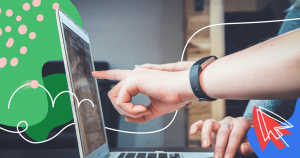Data growth seems undiscussable. In 2020, every person generated 1.7 megabytes of data per second and today it would take a person more than 180 million years to download all the data from the internet. There is definitely an opportunity to consume this data to make decisions, and this is the reason why 94% of the companies say that data is important to their business growth and digital transformation.
In this context, the data science field comes up with the mission of making data useful. How does one deal with this amount of data to deliver insights and recommendations to the business? This is one of the golden questions data scientists have been hired to answer: The U.S. Bureau of Labour Statistics predicts that the number of jobs in the data science field will grow about 28% through 2026.
But have you ever thought about what type of problems data scientists can work on? Just to give you one example, here in Rock Content, we work in a way to predict when a customer will churn before this decision based on data.
From this finding, it is possible to have other teams interacting with the customers and save this revenue in a proactive way. This is not the only application of data science. From challenges related to acquisition of new customers to cross-sell opportunities in business: data scientists focus on consuming data to solve problems.
It is natural to have data scientists approaching those business problems with different strategies. Even though it is healthy – especially when a team is filled with professionals from different backgrounds – there is one characteristic among the most successful ones I would like to discuss.
Data Science projects in real life are not exactly the same that we find in learning environments or in data competition websites, such as Kaggle. It does not mean those data competitions are bad, but dealing with those challenges does not mean the same success will be achieved in real life projects.
How different is it to dealing with data in real life and in a learning environment?
In your daily routine, you may not have a ready-to-go dataset for every scenario. If you do, maybe you could consider reflecting on it. Certainly, it will be the main drive of the outcome from your delivery. The reflection on this point is: how can you answer for a result from your main drive, if you did not work on it?
From this question, it’s important to reinforce: data science definitely begins way before the data. I highly encourage data scientists to put a lot of energy into the problem definition, and not just think about the analytical product that will be delivered at the end. The business comes first. Always.
This is very similar to when marketers do their annual planning, for example. It’s a temptation to launch your presence in the metaverse just because everybody is talking about, for example. But, wait: why do you want to be in the metaverse? What business problems do you want to solve? Remember: strategies always come before tactics.
When we talk about data, using the same approach will ensure the solution is not being thought of before exploring what really might be solved. It is relevant for leaders to engage with data scientists as soon as they can.
Despite the fact that 38% of data practitioners are involved in the decision making, they may not feel that their insights are accurately considered. Several questions can come from this, but certainly a group of them are related to the difference between understanding the data versus understanding the business itself.
With this in mind, we can explore a deeper question: how can data scientists reflect on business problems if they do not heavily understand the business? I definitely agree that the data science project is not an individual activity, however I strongly believe that data scientists can contribute to designing hypotheses.
It is relevant to bring to the table the fact that in a field with a talent gap, the balance between the industry knowledge and hard data skills can be crucial for successful projects.
Data might be just the top of the iceberg
The deep dive into the business understanding should not be seen as a data scientist going beyond his job. This is not true. This kind of behaviour is an inspiration for finally designing the dataset needed for the data science project, and also to initiate another effort on other technical challenges.
Notice that data is just the tip of an iceberg involving much deeper reflections on the business goals. When you assume your job starts from the tip of the iceberg, you must have lost thousands of opportunities.
The effort of framing the business problem probably is the most visible characteristic I have noticed across multiple data scientists from different backgrounds. Naturally, it does not depend only on the data scientist, but also on leadership to bring them to the decision making stage.
Wrap up: bring the data scientists together to discuss the business
To wrap up, there are discussions related to data scientist roles being killed by new tools that can automatically apply machine learning. I strongly disagree. Those tools probably are killing roles that are just writing code without interpretation – or dealing with the tip of the iceberg.
Those able to go deep in the ocean may not be easily replaceable. It requires a mix of skills that goes into action way before the data. Data Science is much more than discussing algorithms and tuning models. This is the answer for understanding why we have so many data scientists doing an excellent job and coming from different areas other than science, technology, engineering and management: it is all about exploring and using hard skills as learnable tools that will help to deliver business improvements.
After all those points, a heavy recommendation is to ensure data practitioners understand the business itself before dealing with technical issues. Contact with the product is one of the best gifts a leader can give to a data scientist and most of the time this effort will lead to valuable insights and an accelerated pace of projects in the near future. The closer the technical team is to the product, definitely the bigger the opportunities that might be seen by them.
On the other hand, remember that the data wrangling magic is just a ‘how’ to reach business goals. By understanding it, we can infer that there is nothing better than business experts to support driving data projects.
I invite you to reflect on what kind of data scientist may be a true game changer for your business, and also recommend that you subscribe to our newsletter, so you can keep updated on fresh themes related to marketing and business.







